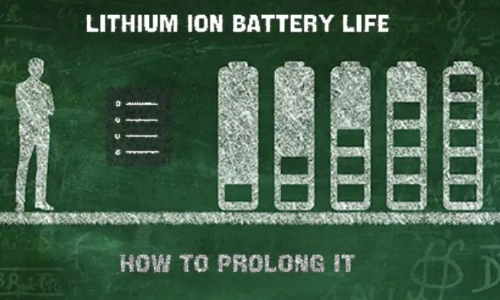Lithium batteries have become integral to our lives, powering various devices such as smartphones, laptops, electric vehicles, and even renewable energy systems. As consumers, we often wonder how long these batteries will last before needing replacement. In this comprehensive guide, we will explore the factors that influence the lifespan of lithium batteries and provide insights into their longevity. So, let’s dive in!

Part 1. What is lithium battery cycle life?
Lithium battery cycle life refers to the number of charge-discharge cycles a lithium battery can undergo before its capacity drops to a specified level.
When you charge a lithium battery, lithium ions move from the positive electrode (cathode) to the negative electrode (anode) through an electrolyte. During discharge, these ions move back. Each time this process happens, a tiny bit of the battery’s materials degrade, leading to a gradual loss of capacity over time.
Manufacturers often specify the cycle life of lithium batteries, typically in terms of the number of cycles until the battery retains around 80% of its original capacity. For example, if a battery has a rating of 500 cycles. In that case, you can charge and discharge it 500 times before it reaches 80% of its original capacity.
Part 2. How do you calculate the cycle life of lithium batteries?
1. Understand the Battery Specifications
Start by gathering information about the lithium battery, including its rated capacity (ampere-hours, Ah), maximum charge and discharge currents, and the manufacturer’s specified cycle life.
2. Determine the Depth of Discharge (DoD)
DOD refers to how much capacity the battery consumes during each cycle. For example, if you discharge a 100Ah battery to 80Ah, the DOD is 20%. Some batteries have longer cycle lives at lower DODs.
3. Calculate the Effective Capacity
Multiply the battery’s rated capacity by the chosen discharge depth to determine the adequate capacity used during each cycle. For instance, if the battery has a rated capacity of 100 Ah and you plan to discharge it to 80% depth of discharge, the adequate capacity for each cycle would be 100 Ah * 0.8 = 80 Ah.
4. Calculate Total Cycles
Divide the battery’s specified capacity by the depth of discharge for each cycle. For instance, if a battery has a capacity of 100Ah and a DOD of 20%, you can get 500 cycles (100Ah / 20Ah per cycle = 5 cycles).
5. Consider Battery Aging and Environmental Factors
Remember that battery cycle life can be affected by factors such as temperature, charging/discharging rates, and overall battery management practices. High temperatures, rapid charging, and deep discharges can accelerate battery degradation, reducing its cycle life.
Part 3. What is the life expectancy of a lithium battery?
The life expectancy of a lithium battery varies depending on its type. Let’s explore some common types and their average lifespan:
- Lithium-Ion (Li-ion) Batteries: Manufacturers widely use Li-ion batteries in portable electronics and electric vehicles. On average, they can last between 2 to 10 years, depending on usage patterns and environmental conditions.
- Lithium Iron Phosphate (LiFePO4) Batteries: LiFePO4 batteries are known for their enhanced safety and longevity. They have a longer life expectancy than Li-ion batteries, ranging from 5 to 15 years.
- Lithium Polymer (LiPo) Batteries: People commonly use LiPo batteries in drones and remote-controlled devices. Their lifespan typically falls between 2 to 5 years.
- Lithium Manganese Oxide (LiMn2O4) Batteries: Users often use LiMn2O4 batteries in power tools and medical devices. They have a moderate lifespan of around 3 to 7 years.
Part 4. What Influences Lithium Battery Lifespan?
1. Temperature
Extreme hot and cold temperatures can degrade lithium battery performance and shorten lifespan. High temperatures accelerate chemical reactions within the battery, leading to faster degradation. Conversely, freezing temperatures can slow down reactions and reduce capacity.
2. Depth of Discharge (DOD)
The depth to which a lithium battery discharges during each cycle affects its lifespan. Shallow discharges, where only a tiny portion of the battery’s capacity gets used, can prolong lifespan compared to deep discharges, where the battery nearly fully discharges.
3. Charging Habits
Charging habits play a significant role in lithium battery lifespan. Overcharging, charging at high currents, or charging too quickly can cause stress on the battery and lead to degradation over time. Using proper charging methods and avoiding overcharging can help extend lifespan.
4. Usage Patterns
The usage of a lithium battery can impact its lifespan. Batteries subjected to heavy or continuous use may degrade faster than those used intermittently or with lighter loads. High current draws or rapid discharge rates can also contribute to degradation.
5. Quality of Battery Management System (BMS)
The battery management system (BMS) regulates the charging and discharging of lithium batteries to optimize performance and protect against overcharging or over-discharging. A high-quality BMS can help prolong battery lifespan by ensuring safe and efficient operation.
Storage Conditions: How lithium batteries are stored when not used can affect their lifespan. Storing batteries at high temperatures or in a fully charged or fully discharged state for extended periods can accelerate degradation. It’s best to store lithium batteries in a cool, dry place at a partial charge.
6. Physical Damage
Physical damage, such as punctures, dents, or moisture exposure, can compromise lithium batteries’ integrity and shorten their lifespan. Proper handling and care to avoid physical damage are essential for maintaining battery health.
Part 5. How to prolong lithium battery life?

1. Avoid Extreme Temperatures
Keep lithium batteries away from extreme heat or cold, which can accelerate degradation. Store them in moderate temperatures whenever possible.
2. Use Partial Discharges
Instead of fully discharging lithium batteries, aim for partial discharges whenever feasible. Shallow discharges put less stress on the battery and can help extend its lifespan.
3. Optimal Charging
Charge lithium batteries using chargers specifically designed for them and follow manufacturer recommendations for charging rates and voltages. Avoid overcharging or rapid charging, as these can degrade the battery over time.
4. Proper Storage
When storing lithium batteries for extended periods, store them at a partial state of charge (around 40-60% capacity) in a cool, dry place. Avoid storing them in fully charged or fully discharged states.
5. Regular Use
Regularly using lithium batteries helps keep them active and healthy. If you have spare batteries, rotate their usage to prevent any single battery from sitting unused for too long.
6. Avoid Physical Damage
Handle lithium batteries with care to avoid physical damage like drops, punctures, or exposure to moisture. Damaged batteries can degrade more quickly and pose safety hazards.
7. Battery Management System (BMS)
If applicable, ensure the battery management system (BMS) functions correctly. The BMS regulates charging and discharging to protect the battery and optimize lifespan.
8. Avoid Overloading
Refrain from overloading lithium batteries with more current or power than their design can handle. Overloading can cause overheating and damage the battery.
Part 6. Do lithium batteries last longer than regular batteries?
Yes, lithium batteries generally last longer than regular batteries, especially when it comes to rechargeable batteries. Lithium batteries, such as lithium-ion (Li-ion) and lithium polymer (LiPo), have higher energy densities and longer cycle lives than traditional alkaline or zinc-carbon batteries.
This means they can provide more power and endure more charge-discharge cycles before their performance degrades. Lithium batteries often have a lower self-discharge rate, allowing them to hold their charge for extended periods when not in use.
Part 7. Which battery has the most extended lifespan?
Among rechargeable batteries, lithium iron phosphate (LiFePO4) batteries are known for having one of the most extended lifespans.
LiFePO4 batteries typically endure more charge-discharge cycles than other lithium-ion chemistries, such as lithium cobalt oxide (LiCoO2) in consumer electronics. They are often rated for thousands of cycles, making them ideal for long-term reliability and durability applications.
Lithium titanate (LTO) batteries are also known for their exceptionally long lifespan, with some models rated for tens of thousands of cycles.
Part 8. Which battery has the shortest lifespan?
Among rechargeable batteries, nickel-cadmium (NiCd) batteries typically have a shorter lifespan than other rechargeable batteries. NiCd batteries are prone to memory effects, where repeated partial discharges can reduce their capacity over time.
Additionally, NiCd batteries contain toxic cadmium, which can harm the environment if not disposed of properly. However, advancements in battery technology have made NiCd batteries less common today, and alternatives like nickel-metal hydride (NiMH) and lithium-ion (Li-ion) batteries offer longer lifespans and better performance for most applications.
Part 9. Final thoughts
In conclusion, properly caring for your lithium batteries can significantly extend their lifespan and ensure reliable performance. By following recommended charging methods, avoiding deep discharges, and providing suitable storage conditions, you can maximize the longevity of these batteries and enjoy long-lasting power for your devices. Remember, a little attention goes a long way in getting the most out of your lithium batteries!
Related Tags:
More Articles

Overview of Deep Cycle Lithium Battery
In this article, we explore the life, voltage, capacity, and charging considerations of deep cycle lithium batteries.
How to Choose the Best LiFePO4 Battery?
Choose LiFePO4 batteries for superior performance, safety, and versatility in EVs, UPS, and backup power. This guide helps you make informed decisions.
Get 12v Lithium Car Battery As a Power Source for the Ride
Make the right choice for your vehicle's battery needs by installing a 12 volt lithium car battery. You will enjoy maintenance-free longevity with this change.
Everything About A Small Lithium Ion Battery
Discover the features, uses & future potential of a small lithium ion battery. A compact and tiny powerhouse ideal for smartphones, wearables, drones & more.
Why Should You Choose Lithium Ion Marine Battery?
Upgrade your boat's power with a Lithium ion marine battery, featuring lighter, longer life, faster-charging abilities. Let's choose the best marine battery.





